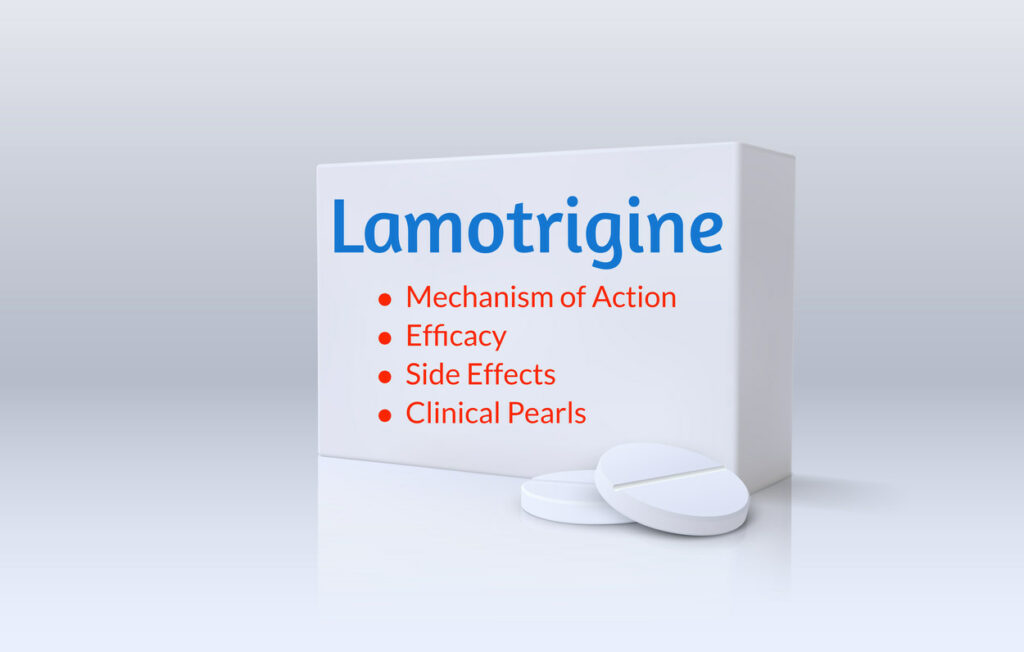Attention Deficit Hyperactivity Disorder (ADHD) is one of the most common neurodevelopmental disorders in children and adolescents. It is characterized by problems with focus, hyperactivity, and impulsiveness. While there are many treatments for ADHD, including behavioral therapy and medication, lamotrigine is an option that has been gaining popularity in recent years. In this blog post, we will discuss the benefits and risks of using lamotrigine for ADHD.
Contents
Defining ADHD
 ADHD is defined as a “persistent pattern of inattention and/or hyperactivity-impulsivity that interferes with functioning or development.” This condition is believed to affect around five percent of American children. It is more commonly diagnosed in boys than girls.
ADHD is defined as a “persistent pattern of inattention and/or hyperactivity-impulsivity that interferes with functioning or development.” This condition is believed to affect around five percent of American children. It is more commonly diagnosed in boys than girls.
There are three types of ADHD:
- Inattentive type
- Hyperactive/impulsive type
- Combined type (inattention and hyperactivity/impulsivity)
Moreover, symptoms must be present for at least six months to warrant a diagnosis. They must also cause problems in more than one setting, such as at home and at school. Some of the symptoms that are associated with ADHD include:
- Easily distracted
- Forgetful
- Unable to focus on tasks
- Excessive talking
- Fidgeting or squirming
- Running or climbing inappropriately
- Difficulty remaining seated
- Interrupting others often
- Blurting out answers
- Difficulty waiting in line
So, these are some of the basics when it comes to ADHD. And, it is essential to treat this condition as soon as possible. This is where lamotrigine comes in.
Lamotrigine for ADHD
 Lamotrigine is a medication that is typically used to treat seizures. However, it has also been found to be effective in treating ADHD. It works by reducing the number of impulses that are sent to the brain. This can help to improve focus and concentration.
Lamotrigine is a medication that is typically used to treat seizures. However, it has also been found to be effective in treating ADHD. It works by reducing the number of impulses that are sent to the brain. This can help to improve focus and concentration.
This medication is believed to be effective for both children and adults with ADHD. In some cases, it may be used as a first-line treatment. However, it is also often used as a second-line or adjunctive treatment. That means it is usually tried after other treatments, such as stimulants, have been ineffective or not well tolerated.
Moreover, researchers have found that lamotrigine works for ADHD in a different way than other medications. It appears to target impulsivity and hyperactivity, rather than inattention. This may make it a particularly good option for people who have trouble with these symptoms.
According to studies, lamotrigine for ADHD is first started at a low dose. The dose is then gradually increased over time until it reaches an effective level. This process can take several weeks or months. In fact, it may take up to three months for the full benefits of lamotrigine to be seen.
Therefore, if you or your child is living with ADHD, talk to your doctor about whether lamotrigine may be a good treatment option.
Dosage Information
There are currently no published clinical trials investigating the optimum lamotrigine dosage for ADHD. However, here is a few pieces of information that you should keep in mind when considering this medication for your child:
- -The starting dose of lamotrigine for children with ADHD is typically between 0.15mg/kg to 0.30mg/kg body weight per day.
- Lamotrigine should be taken with food and increased slowly over a period of several weeks to minimize the risk of side effects.
- The maximum recommended dose of lamotrigine for children with ADHD is 0.60mg/kg body weight per day.
- Also, keep in mind that lamotrigine is a long-acting medication, so it may take up to several weeks for the full effects to be felt.
If you are thinking about trying lamotrigine for your child’s ADHD, it is important to speak with your doctor about the potential risks and benefits. Only a qualified medical professional can determine whether this medication is right for your child.
Benefits Of Lamotrigine For ADHD
 There are many benefits of using lamotrigine for treating ADHD. These include:
There are many benefits of using lamotrigine for treating ADHD. These include:
- improve focus and concentration in people with ADHD
- help to reduce impulsive behavior and hyperactivity
- help to improve sleep patterns in people with ADHD
- changes in brain chemistry that may help to improve mood
- reduces cravings for substances that may be abused
Lamotrigine may also be effective in treating other conditions comorbid with ADHD, such as:
- Bipolar disorder
- Migraine headaches
- Anxiety disorders
- Tourette syndrome
- Epilepsy
Overall, lamotrigine can be an effective treatment for ADHD. It is generally well-tolerated with few side effects. And, it offers several benefits that other ADHD medications do not. If you are considering lamotrigine for treating your ADHD, be sure to discuss the risks and benefits with your doctor.
Risks Of Lamotrigine For ADHD
Although lamotrigine is generally well-tolerated, there are some risks associated with its use. These include:
- Dizziness
- Double vision
- Headache
- Nausea
- Skin rash
If you experience any of these side effects, it’s important to contact your doctor. In rare cases, lamotrigine can cause more serious problems, such as:
- Seizures
- Stevens-Johnson syndrome
- Agranulocytosis
- Liver failure
Because of these potential risks, it’s important that you discuss all the benefits and risks of lamotrigine with your doctor before starting treatment. Moreover, it’s important to follow your doctor’s instructions carefully and report any side effects that you experience.
Lamotrigine is a medication that has been used to treat epilepsy for many years. In recent years, it has also been shown to be effective in treating attention deficit hyperactivity disorder (ADHD).
Things To Discuss Before Taking Lamotrigine
 There are a number of things to discuss with your doctor before taking lamotrigine for ADHD. Here are some key points:
There are a number of things to discuss with your doctor before taking lamotrigine for ADHD. Here are some key points:
- Your current symptoms and how well they’re controlled
- Other medications you’re taking for ADHD or other conditions
- Your family history of mental health disorders
- Any other medical conditions you have
- Your plans for pregnancy or breastfeeding
- Your use of alcohol or other substances
Be sure to tell your doctor about any other medications you’re taking, as they can interact with lamotrigine. Also let them know if you have any allergies, as lamotrigine can cause allergic reactions in some people.
Finally, make sure to follow your doctor’s instructions when taking lamotrigine, as it can be harmful if not used correctly.
If you and your doctor decide that lamotrigine is right for you, be sure to monitor your symptoms carefully. And if any changes are seen then report to your doctor immediately. So, be sure to discuss all the risks and benefits with your doctor.
Are There Any Alternatives?
 There are times when lamotrigine for ADHD might not be the best option. In these cases, other medications or therapies may be recommended. Some of the most common alternatives to lamotrigine for ADHD include:
There are times when lamotrigine for ADHD might not be the best option. In these cases, other medications or therapies may be recommended. Some of the most common alternatives to lamotrigine for ADHD include:
Stimulants
Stimulant medication is often the first line of treatment for ADHD. These drugs can help improve focus, concentration, and impulsivity. It works by increasing levels of the neurotransmitters dopamine and norepinephrine in the brain. Some examples could be:
Non-stimulant Medications
These medications are often used when stimulants are not effective or if there are concerns about side effects. These drugs can take longer to work than stimulants, but they last longer throughout the day. Common non-stimulant medications used to treat ADHD include:
- Atomoxetine (Strattera)
- Bupropion (Wellbutrin)
- Desipramine (Norpramin)
- Imipramine (Tofranil)
- Nortriptyline (Pamelor)
These types of non-stimulants can have their own set of side effects, so it’s important to discuss these with your doctor before starting any medication.
Therapy
 Although therapy is always considered the first line of treatment for ADHD, there are many different types of therapy. And not all of them are effective for every person with ADHD. That’s why it’s important to talk to your doctor or therapist about what might work best for you.
Although therapy is always considered the first line of treatment for ADHD, there are many different types of therapy. And not all of them are effective for every person with ADHD. That’s why it’s important to talk to your doctor or therapist about what might work best for you.
Also, it is important to understand that therapy for mental health disorders is first and foremost about learning how to manage symptoms. There is no “cure” for mental illness, but therapy can help you learn how to better control your thoughts and emotions. It makes you learn to cope with stress and make healthier choices.
Some therapies for ADHD could be:
- Cognitive-behavioral therapy
- Interpersonal therapy
- Family therapy
- Group therapy
Self-Care
It is important to understand that though you are taking medication or therapy, self-care is always the best medicine. This means that you should include some natural means of relaxation and stress relief in your life. These include:
- Take breaks during the day to relax and rejuvenate
- Get regular exercise
- Eat a healthy diet
- Practice meditation or mindfulness
- Aromatherapy
- Get enough sleep
- Keep a journal
- Spend time in nature
These are just a few ideas, but the important thing is to find what works for you and stick with it. The better you take care of yourself, the better your chances are of managing any condition you have.
So, overall these are some basic and very much effective alternatives for ADHD treatment that you can go for. Also, you should always consider your own situation before finalizing anything.
Conclusion
To conclude, lamotrigine for ADHD is a treatment option that comes with both potential benefits and risks. While it may be effective in treating some symptoms of ADHD, it is important to weigh these benefits against the potential side effects. As always, speak with a doctor or mental health professional to determine if lamotrigine is right for you or your child.
Moreover, it’s important to keep in mind that lamotrigine is not a cure for ADHD. Rather, it is a tool to help manage some of the symptoms. As such, it should be part of a comprehensive treatment plan that also includes other interventions, such as therapy and medication.
For more information, please contact MantraCare. ADHD is a neurodevelopmental disorder characterized by difficulty in paying attention, hyperactivity, and impulsivity. If you have any queries regarding Online ADHD Counseling experienced therapists at MantraCare can help: Book a trial ADHD therapy session


